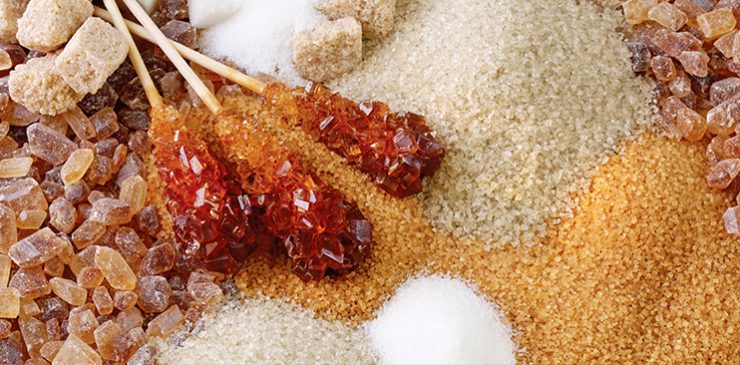We just can’t get enough of it. The World Health Organization recommends that we consume no more than 5-10 teaspoons of added (processed) sugar a day, but people on average are eating 19 teaspoons a day.
That adds up to about 60 lbs. a year! Think what 60 lbs. looks like – that’s A LOT of sugar – and it has absolutely no nutritional value or benefit to your health.
All that excess sugar is associated with weight gain/obesity, type 2 diabetes, atherosclerosis, inflammation, weakened immune function, decreased bone health, depression, fatigue and sleep difficulties. Interestingly, these are all conditions people with SCI are at increased risk of developing. So if you’re eating and drinking more than the recommended amount every day, it is critical that you reduce your sugar intake and help reduce your risk of these serious health complications.
Part of the problem is many people are over consuming sugars without even knowing it. There are at least 61 different names for sugar listed on our food labels and many of them sound healthy so we don’t think twice about eating them;
- Cane juice
- Corn syrup
- High fruit concentrate
- Malt syrup
- Palm sugar
- Beet sugar
- Brown rice syrup
Here are four simple tips to help you reduce your daily sugar intake and stay healthy.
-
Read Food Labels Carefully
- On the Nutrition Facts – always choose foods that have five or less grams of sugar per serving (this is just over 1 tsp.).
- On the Ingredients List – items are listed from most to least. If sugar is one of top three ingredients it’s too much – don’t eat it.
-
Eliminate Common Foods with High Sugar Content
- Pop (has approximately 40 grams per serving)
- Sports Drinks (approximately 30 grams per serving)
- Iced Tea
- Cookies
- Cakes
- Donuts
- Candy bars
- Processed muffins
- Processed cereals
- Canned fruit
- Low fat products (sugar is added to make these foods palatable)
- Condiments such as BBQ sauce and ketchup (you’d be surprised how much sugar is packed into just one spoonful)
-
Eat Natural Sugars
- Fruits
- Pure maple syrup
- Honey
-
Replace Artificial Sweeteners
- Aspartame
- Sucralose
- Maltodextrin
- Saccharin
These sugar substitutes are found in products such as NutraSweet, Equal, Splenda and Sweet N’ Low. They may be convenient and have zero calories, but they can also have negative side effects.
Use these healthy low calorie sweeteners instead;
- Stevia (Made from the leaves of the stevia plant. Comes in liquid or powder form)
- Monk fruit (Made from the South Asian fruit. Comes in liquid or powder form)
- Swerve (Contains the natural sweeteners, erythitol and oligosaccharides)






